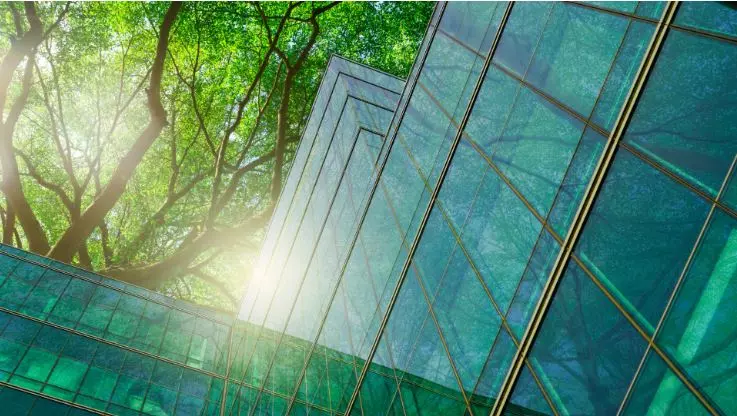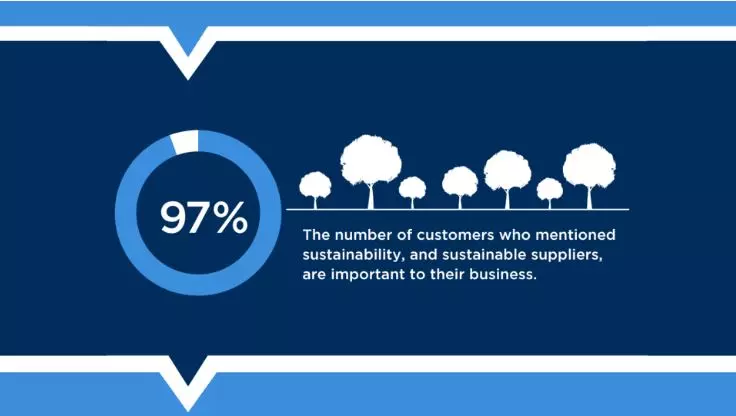What sustainability in construction really means
When we say sustainability, we mean...
It’s widely acknowledged that the construction industry relies on and consumes natural resources on a vast scale. Research from construction blog Bimhow suggested that in 2021, the construction sector contributed to 23% of air pollution, 50% of climatic change, 40% of drinking water pollution and 50% of landfill wastes. With demand in the built environment predicted to keep growing at a steady pace, this consumption is only likely to increase.
The industry is placing greater priority on green credentials, and companies are working towards becoming net zero to minimise their impact on the planet. But as pressure mounts worldwide to manage the impact of climate change, and the availability of natural resources become more finite, the debate on the role the industry can play in creating a more sustainable future is evolving at pace.
What does sustainability mean in construction?
The definition of sustainability can vary. Within construction, it can be referred to as ‘eco’ or ‘environmentally friendly’ processes. It can be small changes to operations which better look after our planet. Overall, it requires a balance of economic growth, environmental care and social well-being so in that sense, when we consider sustainability, we can focus on three key areas - people, place and planet. Today, businesses must consider how they rank for all three.
Right now, there is a strict mandate on businesses working in all areas of the construction industry supply chain to work towards carbon net zero targets, while proposals such as those in the CLC’s Roadmap to Recovery continue to gain pace. At a micro level, there is a wealth of employers who contribute to their local communities in lots of other ways. Together, this means there is a lot for businesses to consider, while also trying to operate at a profit in a sector that is already dogged by other challenges, like the lasting impact of the pandemic and Brexit, and escalating health and safety issues.
However, such is the importance of sustainability, that any business which doesn’t make clear its stance on the matter immediately risks losing an element of competitiveness; green credentials have become currency, described as a key differentiator by executives working at 59% of businesses in construction. The good news is that there is a wealth of support available from within the industry and from government to help businesses put sustainability top of the agenda.

Where things stand today
The UK has promised to reach net zero greenhouse gas emissions by 2050, which will require fundamental changes to the way the construction industry functions.
To play its role in achieving the targets, in 2017 the industry made an agreement with the government to halve emissions in the built environment by 2025. In part, this was to be achieved by improving the energy performance of existing building stock, and by delivering low carbon assets quicker and at a lower cost. Additionally important, was for companies to develop sustainable supply chains, through the likes of merchants, in order to reduce scope 3 emissions, ensuring entire networks were playing their role in the road to becoming net zero by 2050.
But figures show that today, just three years ahead of that deadline, the industry still accounts for almost half (45%) of total UK carbon emissions.
A recent global survey painted a more positive picture, though. The research across multiple sectors showed executives in the engineering and construction industries have made the most progress toward sustainability, with 47% of respondents saying sustainability is top-of-mind or a major concern for them. Large parts of this will be down to the relationships firms are building with their merchants, and their merchants’ supply chains, and as we move forward will continue to be vital to achieving the country’s green targets.

The benefits of prioritising sustainable construction
In fact, in our recent customer satisfaction survey, 97% of customers mentioned sustainability, and sustainable suppliers, as being important to their business. For Artex, sustainable construction centres on the role we play within the supply chain, and how what we do contributes towards customers being able to reduce their scope 3 emissions.
Our mission is to be a business that our people love to work for and our industry want to buy from. We strive to be a sustainable supplier by using low-CO2 transport, by ensuring we remove as many fossil fuels from our site as possible, and by transforming our activities to be net-zero carbon. We also focus on sustainable marketing, operating responsibly and investing in sustainable initiatives on site like our biodiversity area.
And there is increasing evidence which points to the benefits for those working in the industry who strive to achieve the same.
Many principal contractors have committed to introducing more environmentally and socially responsible operations and project delivery because they know that, when awarding projects, clients will pose several questions and requirements of their expectations around environmental and social performance, which will form part of their assessment and ranking process for bidders.
As well as having the potential to increase margins in the immediate future, building a reputation as a business that supports the planet through a sustainable supply chain or through the enabling of sustainable practices helps develop a long-term pipeline of business. Predictions are that green construction will double its revenues every three years, making now a greater time than any other to align your business with sustainability.
Furthermore, by adopting sustainable practices and developing ethical environments within your own organisation, your people benefit from greater health and wellbeing, and you make your own direct contribution to protecting the planet.
At Artex, amongst other initiatives, we have installed a biomass heating system that is part-funded by a £300,000 investment from our parent company, Saint-Gobain’s Carbon Fund. The renewable heating system has completely replaced our previous diesel and gas heating system, running off wooden pellets that would otherwise go to waste. Not only is this predicted to reduce our CO2 emissions by 150 tonnes a year, but it will also provide a more comfortable working environment for our colleagues and a cleaner, more sustainable site for the whole community.

Additionally, as part of our low CO2 transport, we’re transitioning to use HVO fuel in our HGVs and offer combined deliveries with other Saint-Gobain brands to reduce the number of lorries visiting a customer’s branch. Not only does this reduce the amount of carbon in the supply chain, it also improves air quality for our colleagues on site, our local community and also our customers as HVO emits fewer nitrous oxides into the air. We’re also reducing our plastic packaging and improving on-pack recycling information to make it easier to recycle.
It’s important to us to set our own benchmarks, against which we can aim to achieve more and more each year. If we all apply the same approach, collectively we can define what sustainability means in construction and ensure we lead the charge in futureproofing the planet.